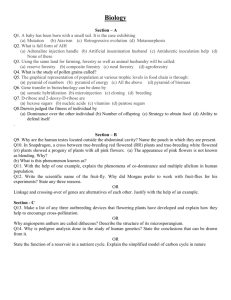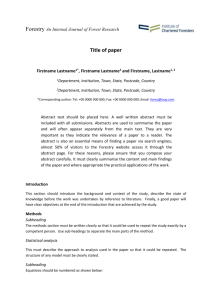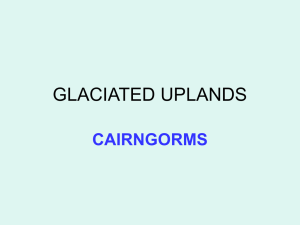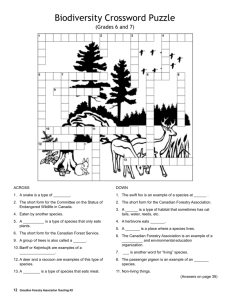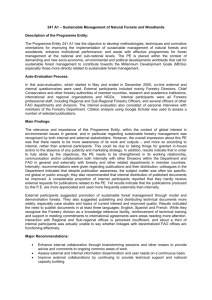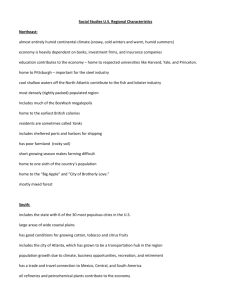Farming and Forestry Task Force Notes
advertisement
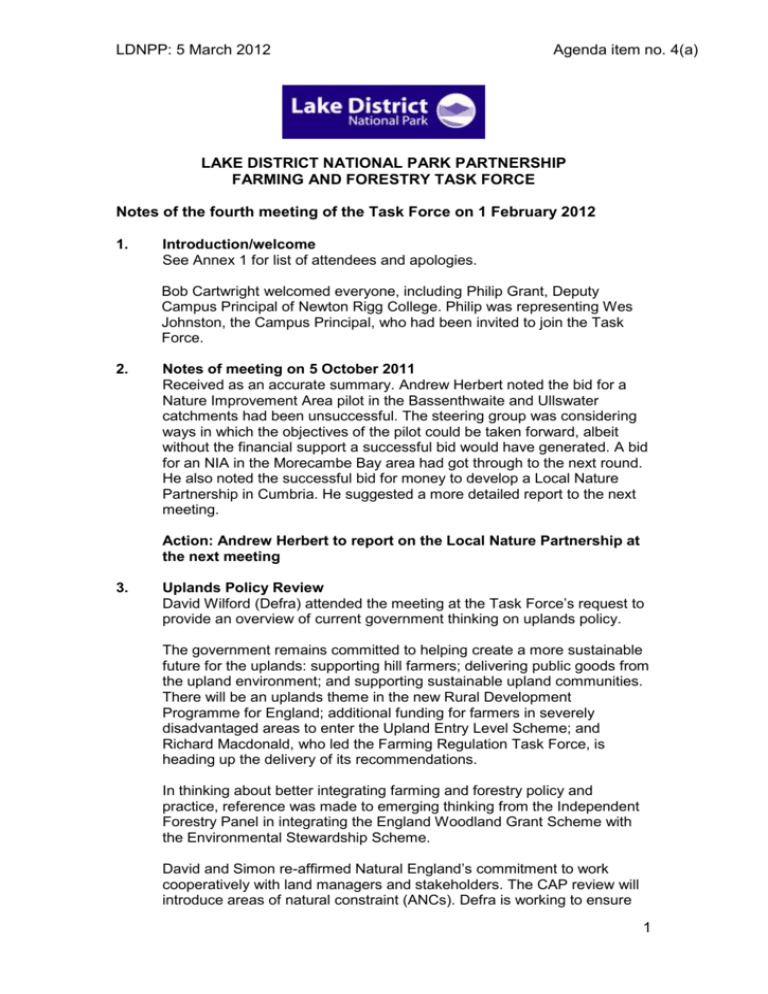
LDNPP: 5 March 2012 Agenda item no. 4(a) LAKE DISTRICT NATIONAL PARK PARTNERSHIP FARMING AND FORESTRY TASK FORCE Notes of the fourth meeting of the Task Force on 1 February 2012 1. Introduction/welcome See Annex 1 for list of attendees and apologies. Bob Cartwright welcomed everyone, including Philip Grant, Deputy Campus Principal of Newton Rigg College. Philip was representing Wes Johnston, the Campus Principal, who had been invited to join the Task Force. 2. Notes of meeting on 5 October 2011 Received as an accurate summary. Andrew Herbert noted the bid for a Nature Improvement Area pilot in the Bassenthwaite and Ullswater catchments had been unsuccessful. The steering group was considering ways in which the objectives of the pilot could be taken forward, albeit without the financial support a successful bid would have generated. A bid for an NIA in the Morecambe Bay area had got through to the next round. He also noted the successful bid for money to develop a Local Nature Partnership in Cumbria. He suggested a more detailed report to the next meeting. Action: Andrew Herbert to report on the Local Nature Partnership at the next meeting 3. Uplands Policy Review David Wilford (Defra) attended the meeting at the Task Force’s request to provide an overview of current government thinking on uplands policy. The government remains committed to helping create a more sustainable future for the uplands: supporting hill farmers; delivering public goods from the upland environment; and supporting sustainable upland communities. There will be an uplands theme in the new Rural Development Programme for England; additional funding for farmers in severely disadvantaged areas to enter the Upland Entry Level Scheme; and Richard Macdonald, who led the Farming Regulation Task Force, is heading up the delivery of its recommendations. In thinking about better integrating farming and forestry policy and practice, reference was made to emerging thinking from the Independent Forestry Panel in integrating the England Woodland Grant Scheme with the Environmental Stewardship Scheme. David and Simon re-affirmed Natural England’s commitment to work cooperatively with land managers and stakeholders. The CAP review will introduce areas of natural constraint (ANCs). Defra is working to ensure 1 LDNPP: 5 March 2012 Agenda item no. 4(a) these reflect the characteristics of our uplands and their issues, including the importance of hefting on commons. Future priorities would include: making payments for ecosystem services a reality. Resource management on a catchment scale – supporting practical carbon and water management. High speed broadband and mobile telephony. Localism – more powers to local communities. Achieving the right balance between food production, environment and people. But increasingly this would involve local determination of priorities, including on such issues as sustainable intensification. In an earlier conversation with the farmers, David and Simon had heard concerns about uncertainties surrounding transfer from ESA to Environmental Stewardship, the effect of losing hefted flocks and the difficulties in balancing off-wintering obligations with livestock quality and welfare. It was suggested that practical examples of land in favourable condition (in Natural England’s terms) and other ‘public goods’ would help farmers understand the outcomes to which they and ecologists should jointly aspire. David felt it would also be helpful if Defra/NE could be appraised of any literature on hefting culture and practices. 4. Rare Breed Rob Fraser introduced this project, which celebrates the cultural importance of upland farmers, their families and others, through photography and words. The project had received widespread support, including from the National Park Authority’s Sustainable Development Fund and was hoping to exhibit widely. There was the prospect of a book and an education pack as well as on-line material. The Cumbria Farmers Network is actively involved but Rob welcomed further participation and distributed contact information. Action: Task Force members to contact Rob Fraser if they wished to participate in the project. 5. Rural road maintenance Peter Allan attended the meeting in response to a concern raised by the Task Force about the County Council’s policy on maintaining roads to farms or forests, which were vital to business viability. Peter explained the Council’s wider policies and priorities and the implications of bringing the previously outsourced service in-house. Policies on specific roads were subject to a general duty and responsibility to maintain safe passage for users, but he would be willing to discuss particular cases outside the meeting. Task Force members suggested a need for greater clarity on responsibility for maintenance within the highway boundary, particularly ditches and tree management. Action: Peter Allan to liaise directly with John Fryer Spedding about specific issues at Brundholme Woods. 2 LDNPP: 5 March 2012 Agenda item no. 4(a) 6. Red Squirrels Northern England Nick Mason explained the purpose of the project was to control grey squirrels across Cumbria, Northumberland, Durham and North Yorkshire as means of protecting the vulnerable population of red squirrels. With the benefit of Biffaward funding the project was recruiting several squirrel management officers in priority areas across the region, working closely with private and public owners and with volunteer groups. Monitoring action and effect was essential to the project’s success and Nick encouraged the Task Force to promote the project’s work and work with it. Contact details were shared. 7. Iggesund Neil Watkins described the ethos of Iggesund as part of the international Holmen Group in producing paper and paperboard from its plant at Workington. The plant has an objective to be carbon-neutral and is currently installing a biomass energy system. Neil is actively engaged in identifying sites throughout the region to supply fuel and would welcome approaches from Task Force members or contact from interested landowners. 8. Independent Forestry Panel Bob noted that the visit to Cumbria had been confirmed as 7 March 2012. Keith Jones had established a small planning group of Task Force members (Ian Jack, Graham Gill, Ed Mills, Jack Ellerby, Bob Cartwright) plus Richard Palmer of Jenkinson’s to develop a provisional programme and itinerary to put to the Panel’s secretariat. The group would be meeting on 2 February. The thrust of the visit was to be around rural development and economic growth associated with woodland and forestry and the geographical focus would be Penrith and the north eastern part of the National Park. The Task Force agreed that the chair of the Lake District Local Access Forum should be invited to the visit. Action: Bob Cartwright to report the outcome of the planning group’s meeting to the Task Force after the 2 February meeting. 9. Priority Issues for inclusion in the next Partnership’s Plan The Task Force received a paper prepared by Helen Forrester (NFU) as the lead for this action in the Partnership’s Plan (Action 6). The Task Force noted the current Partnership’s Plan contains a number of specific priority actions, which the Task Force agrees are important. It welcomed the Partnership’s commitments and urged it to deliver them by the stated deadlines. For example, the Task Force felt it important to have a Woodland Strategy for the National Park in place by December 2012 (Action 7B). The Task Force acknowledged, however, that some slippage would be inevitable in certain areas: it would be difficult for Natural England, for example, to deliver a meaningful report on possible funding options post2014 in respect of the review of the Common Agricultural Policy (Action 3 LDNPP: 5 March 2012 Agenda item no. 4(a) 5A) due to delays in the review itself. Similarly, the Task Force was not in a position to prepare a report to the Partnership on the value of livestock in the National Park (post-2014) (Action 5B). 3.3 In considering future Partnership’s Plan issues to be addressed to support farming and forestry, the Task Force recommended the following priority actions: i. Profitable Farming and Forestry: The commissioning, by the Partnership, of a professional assessment of the existing profitability of the farming and forestry industries in the National Park and future prospects within the context of protecting and enhancing the Lake District’s special qualities. Such a report, it was suggested, should assess the risks and opportunities presented in terms of wholebusiness profitability, not just the economics of livestock or timber production. Thus it could take account of the expected impact of changes in Environmental Stewardship agreements, and the opportunities and constraints on diversification, as well as market fluctuations. ii. Reform of the Common Agricultural Policy: This would roll forward Action 5A from the current Plan with an amended deadline of March 2013. iii. Farming and Forestry’s contribution to a Low-carbon Lake District™: Potentially forming part of 3.3i, this would assess the potential for every farming and forestry business to be a net energy exporter through the use of renewable technology. iv. The Lake District on a Plate: This would roll forward and develop Action 15A in the current Plan to support sustainable food and drink across the National Park. Greater cooperation between local tourism businesses, farmers and foresters would give visitors (and the local community) every opportunity to ‘taste the view’. v. Housing Availability and Succession: The farming and forestry communities believe that the unaffordability of local housing for local people is a major barrier to business succession from one generation to the next. This issue could be addressed by rolling forward Actions 23, 24 and 25 in the current Plan, which all relate to developing and delivering balanced employment and housing opportunities that enable people to live and work in the community. Action: Bob Cartwright to prepare a report for the Partnership’s meeting on 5 March 2012 recommending these actions as priorities for the next iteration of the Partnership’s Plan. 4 LDNPP: 5 March 2012 6. Agenda item no. 4(a) Matters for future meetings: The next meeting is on 6 June 2012. The Task Force will receive and consider reports on the agreed priorities as they evolve. The Task Force agreed that the agenda for this meeting had been a little ‘top heavy’ in the number of presentations given. All were interesting, but with other important issues to discuss we hadn’t done justice to all topics; opportunities for questions and conversation were curtailed. We agreed to aim for no more than three presentations from speakers at future meetings. Provisionally the next agenda will therefore include presentations on: Testing ecosystem services funding: the Bassenthwaite Vital Upland Project: Jane Lusardi, Natural England Affordable Housing for people in farming and forestry: Paula Allen, LDNPA Local Nature Partnership: Andrew Herbert, LDNPA A future meeting will consider: Deer management: Ed Mills, Cumbria Woodlands The impact of the Localism Act and the role of the NPA in encouraging working together: Steve Ratcliffe, LDNPA. Access management: Mark Eccles, LDNPA. 7. Date of next meeting: 6 June 2012 at 6.00 p.m. at the Lake District Visitor Centre, Brockhole. 5 LDNPP: 5 March 2012 Agenda item no. 4(a) Annex 1 Lake District Farming and Forestry Task Force: 1 February 2012 Attending Farmers’ Meeting with David Wilford, Head of Defra’s Uplands at 4.00 p.m. Total attending (14) NAME Chris Brown Bob Cartwright Anne Casey Andrew Herbert Neil Johnson Will Cockbain Mark Eccles John Hayton Sam Hodgson Simon Humphries Will Rawling Joe Relph Carl Walters David Wilford ORGANISATION Deepdale Hall LDNPA (Chair) LDNPA LDNPA National Trust NFU LDNPA LDNPA Glencoyne Farm Natural England Cumbria Farmers Network Yew Tree Farm, Borrowdale Cumbria Farmers Network Defra Apologies: (4) Ken Bell Everley Buckley Dan Hunt Ken Pears Loweswater Care Project CLA Natural England Caldbeck Commoners 6 LDNPP: 5 March 2012 Agenda item no. 4(a) Attending: Farming & Forestry Task Force at 6.00 p.m. (27) Peter Allan Chris Brown Gareth Browning Bob Cartwright Anne Casey Will Cockbain Mark Eccles Jack Ellerby Helen Forrester Rob Fraser John Fryer-Spedding Philip Grant John Hayton Andrew Herbert Sam Hodgson Doug Howieson Simon Humphries Ian Jack Neil Johnson Nick Mason Edward Mills Will Rawling Joe Relph Harriet Sharkey Carl Walters Neil Watkins Dave Wilford CCC (item 5) Deepdale Hall Forestry Commission LDNPA (Chair) LDNPA NFU LDNPA FLD NFU Rare Breed (item 4) Mirehouse Deputy Campus Principal, Newton Rigg LDNPA LDNPA Glencoyne Farm Forestry Commission Natural England Lowther Estates National Trust RSNE (item 6) Cumbria Woodlands Cumbria Farmers Network Yew Tree Farm, Borrowdale Rare Breed (item 4) Federation of Cumbrian Commoners Iggesund Defra (item 3) Apologies: (12) Ken Bell Everley Buckley Peter Irving Wes Johnson Keith Jones Terry McCormick Trevor Marsh Ken Pears Steve Ratcliffe Myles Sandys Robert Sheasby Stephen Swailes Loweswater Care Project CLA Hutton Roof Sawmills Newton Rigg Forestry Commission ACT Environment Agency Caldbeck Commoners LDNPA Graythwaite Estate NFU Iggesund 7
